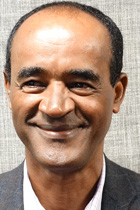13:00: Lunch seminar: Ethnicization and Regionalism: The Case of Ethiopia
 Post-1991 Ethiopia is marked by the politics of ethnicity. Indeed, ethnicity has become the foundation of Ethiopian Federalism (Vaughan 2003; Turton 2006). Ethiopia comprises nine regions organized on the basis of ethnic alliances. These federal state is formed from these semi-autonomous regions. Article 39 of Ethiopia’s 1995 constitution gives rights to ethno-linguistic groups or nationalities to form their own governments, including the right to secede. The former Soviet Union and Yugoslavia had a similar arrangement before they were dissolved. Currently, there is no state based on this kind of organization and principle. Ethiopia has no less than 80 ethno-linguistic groups or nationalities. Demands for better rights and self-administration have become the order of the day. Some groups have achieved that status and others are struggling to attain it. Identity related demands and separate administration, in order to get a better share of resources, are mushrooming in the country. Consequently, the country’s national interest and sovereign status is under question (Abbink 2009; Assefa 2012). There are divisions between indigenous and newcomers in some regions (Asnake 2009; Dereje 2006). Some regions give priority to their kin groups. On the other hand, the federal constitution has given all citizens the right to work and own property in any region of their preference. The regional constitutions appear not to accommodate what is enshrined in the federal constitution.
Post-1991 Ethiopia is marked by the politics of ethnicity. Indeed, ethnicity has become the foundation of Ethiopian Federalism (Vaughan 2003; Turton 2006). Ethiopia comprises nine regions organized on the basis of ethnic alliances. These federal state is formed from these semi-autonomous regions. Article 39 of Ethiopia’s 1995 constitution gives rights to ethno-linguistic groups or nationalities to form their own governments, including the right to secede. The former Soviet Union and Yugoslavia had a similar arrangement before they were dissolved. Currently, there is no state based on this kind of organization and principle. Ethiopia has no less than 80 ethno-linguistic groups or nationalities. Demands for better rights and self-administration have become the order of the day. Some groups have achieved that status and others are struggling to attain it. Identity related demands and separate administration, in order to get a better share of resources, are mushrooming in the country. Consequently, the country’s national interest and sovereign status is under question (Abbink 2009; Assefa 2012). There are divisions between indigenous and newcomers in some regions (Asnake 2009; Dereje 2006). Some regions give priority to their kin groups. On the other hand, the federal constitution has given all citizens the right to work and own property in any region of their preference. The regional constitutions appear not to accommodate what is enshrined in the federal constitution.
In his study, Alemayehu Gurmu argues that ethnic-based state formation and practice is challenging the peaceful co-existence of people of diverse backgrounds and the sovereignty of the nation state.
Please bring your own lunch. Coffee/tea will be provided.
This lunch seminar will be followed by the Ethiopia Country Meeting at 14.00, also at the Pieter de la Courtgebouw (room to be announced).

